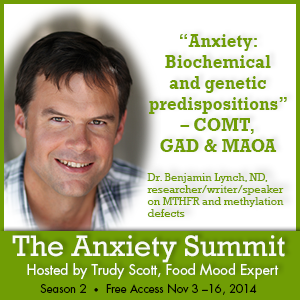
Dr. Benjamin Lynch, ND Researcher/writer/speaker on MTHFR and methylation defects, was interviewed by host of the Anxiety Summit, Trudy Scott, Food Mood Expert and Nutritionist, author of The Antianxiety Food Solution.
Anxiety: Biochemical and genetic predispositions – COMT, GAD & MAOA
- MTHFR, methylation, SAMe and anxiety (and other health effects)
- Good forms of folate
- How too much folate can raise norepinephrine and cause anxiety
- COMT genetic polymorphisms and anxiety: estrogens, xenoestrogens and sulfur
- MAOA genetic polymorphisms and anxiety: tyramines and histamine
- GAD genetic polymorphisms and anxiety: MSG, glutamates and GABA
- How to test for and interpret these genetic polymorphisms?
- Three top recommendations to reduce anxiety
Here are a few snippets from our interview:
MTHFR helps produce the body’s most active form of folate. So when you eat your uncooked leafy greens or your steamed leafy greens, you are getting ample amounts of methylfolate, which is great. But if you’re eating your dried cereal, your energy bars, your energy drinks or taking your prenatal vitamins and you think you’re doing a great thing and all of these things have this synthetic folic acid, then that is a big problem, because folic acid is absolutely synthetic and that folic acid has to be transformed into the most active form of folate, which is methylfolate because that’s what your body uses. It doesn’t use folic acid. You think folic acid is actually useful for things like neural tube defects, but it’s not; it actually has to be transformed. And so MTHFR contributes the last most important step for that to happen.
Methylfolate, along with vitamin B12, and the protein that you eat help make one of the most important compounds called SAMe. So when you eat your protein and your methylfolate levels are adequate, then you are able to make your neurotransmitters. And if you are unable to make neurotransmitters or eliminate them, you’re going to have symptoms of anxiety, depression, bipolar disorders, schizophrenic episodes, manic episodes, and so on.
The GAD enzyme helps get rid of glutamate and turns that into our docile calming GABA neurotransmitter. It needs magnesium and vitamin B6 to function.
One gene that’s very common in the population that’s also kind of messed up is COMT. COMT is a gene which does multiple, multiple things, but one of which is helps break down dopamine. The other one, it helps break down estrogen.
Another one for anxiety is MAOA, so that’s monoamine oxidase. Histamine is very related to anxiety, and that’s tied in because of the MAOA enzyme, so reducing your histamine-containing foods is a big one.
We mentioned that we’d share some links to MTHFR blog posts on Dr. Lynch’s site. Here is one – MTHFR A1298C Mutation: Some Information on A1298C MTHFR Mutations and MTHFR C677T Mutation: Basic Protocol
We didn’t mention specific studies during the interview but here are a few:
- Are there depression and anxiety genetic markers and mutations? A systematic review.
- Association of a MAOA gene variant with generalized anxiety disorder, but not with panic disorder or major depression.
Dr. Lynch discussed the 23andme genetic testing and said this:
Genetic testing should be an empowering thing for you. You know it’s access to knowledge that can really be beneficial to you, if it’s utilized properly.
Here are links for 23andme (my affiliate link) for doing the genetic testing, and Geneticgenie.com and MTHFRsupport.com for getting the reports.
Here is information about Dr Lynch’s part 1 and part 2 practitioner training (which is very heavily referenced): Methylation & Clinical Nutrigenomics
Dr. Lynch has a free download: folate video presentation along with a pathway planner
If you are not already registered for the Anxiety Summit you can get live access to the speakers of the day here www.theAnxietySummit.com